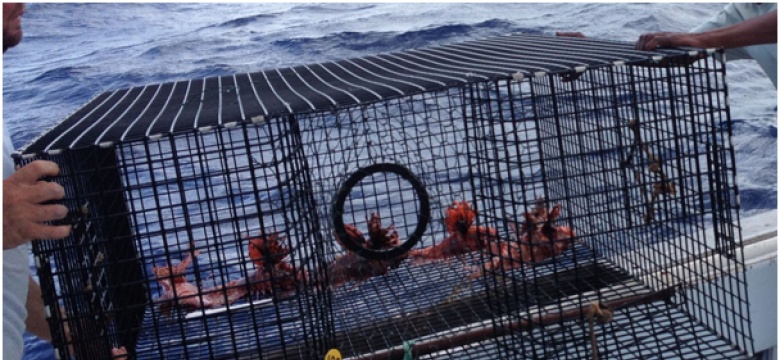
The Department of Environment and Natural Resources advises the public that several commercial fishermen will be using experimental lionfish traps this summer. Boaters are asked to be careful to avoid these traps.
Currently, traps are located east of St. David’s Head in approximately 25-28 fathoms (150-168ft) of water; however, traps will also be placed in other areas of the Bermuda Platform – South Shore, Southwest, East and North. Traps will be identified with flag buoys similar to those used on lobster traps.
“The threats that lionfish pose to Bermuda’s reef system are real,” said Dr. Tammy Trott, Senior Marine Resources Officer for the Department of Environment and Natural Resources.
“The experimental trapping programme has been implemented in an attempt to increase the harvest of this invasive species. Commercial fishermen have been catching lionfish in their traps as bycatch since 2003. However, the traps are usually only set in deeper waters from September to the end of November. As research has shown that lionfish are in deeper waters in the summer also, the trappers will hopefully be able to remove numbers of lionfish from the reefs during this period. This will complement the volunteer culling programme that helps control lionfish in the shallows, particularly during the winter time.”
The lionfish traps are similar in design to lobster traps and have a fixed funnel so that large fish like groupers cannot get into the traps. They also have escape slots that allow smaller fish to get out but keep the lionfish in.
Fishermen will be baiting the lionfish traps differently from lobster traps in order to keep the lobster catch to a minimum during the breeding season. The fishermen have strict terms and conditions attached to their lionfish trapping licences, which require the immediate release of any lobsters caught, and observers will be present on most of the fishing trips.
Dr. Trott continued, “As the trapping programme is still experimental, the fishing trips will be subsidized with money raised through the Bermuda Lionfish Taskforce (a collaborative effort between Government, NGOs, and concerned citizens), which includes a very generous donation from local hardware store Gorham’s Limited.”
The Minister of Environment, Cole Simons, said, “The Government is committed to supporting this critical element of our marine protection and we will continue our efforts to reduce numbers of invasive lionfish in Bermuda’s waters.”
“We need as much help as possible to meet this threat head on, we need to slow them down.” said Minister Simons.
“I am very grateful to the Bermuda Lionfish Taskforce for their continued efforts. They are integral in our fight against the lion fish and protecting our marine environment.”
For more information on the experimental lionfish trapping programme, the public is invited to contact the Marine Management Section at 293-5600 or fisheries@gov.bm. The public is also encouraged to learn more about the work of the Lionfish Taskforce at www.lionfish.bm.
